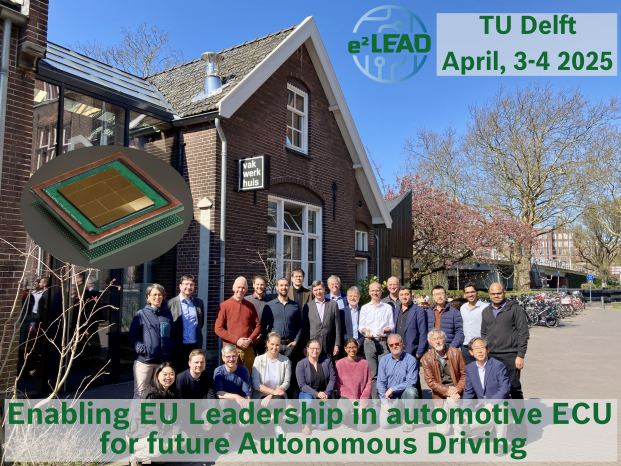e²LEAD
Enabling EU Leadership in automotive ECU for future Autonomous Driving

Project Facts

Project Lead
BOSCH

Countries
2

Partners
14

Costs
>9 Mio. €

Research Area
Transport and Smart Mobility

Duration
36 Months
Latest News
04/2025 e²LEAD - Enabling EU Leadership in automotive ECU for future Autonomous Driving – 2nd Year Review Meeting hosted by TU Delft.

On April 3rd and 4th we met in Delft in the Netherlands for our second year review meeting. After the first two years we successfully developed the methods and components and are now ready to enter the integration and test phase of the project. It has been two years since we began our collaboration on Advanced Packaging for automotive electronics. Together with our partners — Audi, Cariad, CADFEM, Fraunhofer ENAS, ILFA, NanoTest, Nexperia, Boschman, Jiaco, IWO, TU Berlin, TU Chemnitz, TU Delft and Bosch — we are developing a supercomputing platform for future autonomous driving. Our work focuses on three key domains:
- Connectivity: Developing high-performance data interfaces and low-stress cooling solutions.
- Technology: Innovating automotive chiplets and smart power stages.
- Reliability/Safety: Creating new testing strategies and compact digital twins for coupled thermal and thermo-mechanical domains.
On the second day after the 2nd year review has been finished, we sat together to discuss the upcoming challenges and held a workshop about virtual referencing. During the last two years, the partners came up with many new ideas for a demonstrator version with different chip sizes providing a more asymmetric and thus realistic design. Therefore, we applied for a half year project extension to implement a demonstrator version with an advanced design. Many of our partners stayed in the Netherlands over the following weekend to attend and present their work at the EuroSIMe conference in Utrecht in the subsequent week. The IEEE EPS chapter took this opportunity to also organize a seminar titled “Progress and Future of Heterogenous System Integration, Packaging, and Reliability” at TU Delft.
Distinguished speakers from both, university and industry gave insights into the current and upcoming challenges in chiplet packaging and heterogenous integration.
This research is made possible through funding from BMBF Germany, Rijksdienst voor Ondernemend Nederland, and the European Union via Xecs (part of the Eureka Cluster).
Partners



















